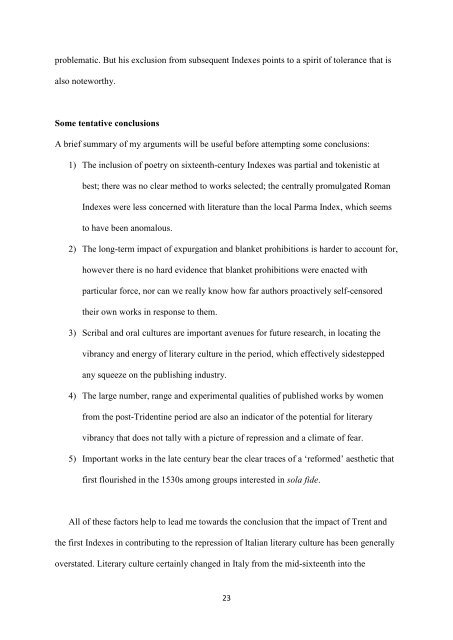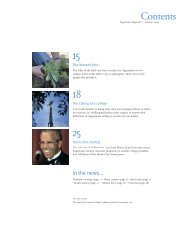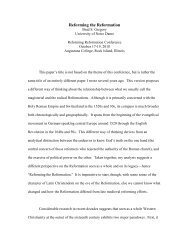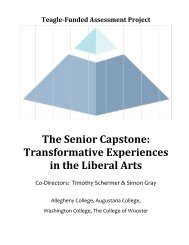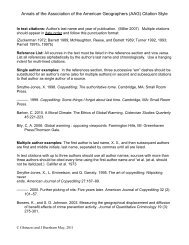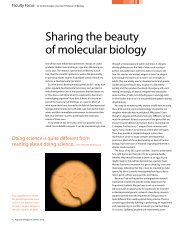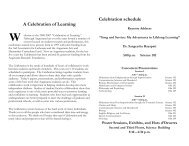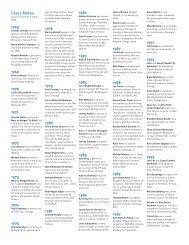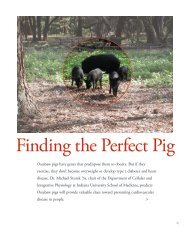Re-Writing Trent, or What Happened to Italian Literature in the Wake ...
Re-Writing Trent, or What Happened to Italian Literature in the Wake ...
Re-Writing Trent, or What Happened to Italian Literature in the Wake ...
You also want an ePaper? Increase the reach of your titles
YUMPU automatically turns print PDFs into web optimized ePapers that Google loves.
problematic. But his exclusion from subsequent Indexes po<strong>in</strong>ts <strong>to</strong> a spirit of <strong>to</strong>lerance that is<br />
also notew<strong>or</strong>thy.<br />
Some tentative conclusions<br />
A brief summary of my arguments will be useful bef<strong>or</strong>e attempt<strong>in</strong>g some conclusions:<br />
1) The <strong>in</strong>clusion of poetry on sixteenth-century Indexes was partial and <strong>to</strong>kenistic at<br />
best; <strong>the</strong>re was no clear method <strong>to</strong> w<strong>or</strong>ks selected; <strong>the</strong> centrally promulgated Roman<br />
Indexes were less concerned with literature than <strong>the</strong> local Parma Index, which seems<br />
<strong>to</strong> have been anomalous.<br />
2) The long-term impact of expurgation and blanket prohibitions is harder <strong>to</strong> account f<strong>or</strong>,<br />
however <strong>the</strong>re is no hard evidence that blanket prohibitions were enacted with<br />
particular f<strong>or</strong>ce, n<strong>or</strong> can we really know how far auth<strong>or</strong>s proactively self-cens<strong>or</strong>ed<br />
<strong>the</strong>ir own w<strong>or</strong>ks <strong>in</strong> response <strong>to</strong> <strong>the</strong>m.<br />
3) Scribal and <strong>or</strong>al cultures are imp<strong>or</strong>tant avenues f<strong>or</strong> future research, <strong>in</strong> locat<strong>in</strong>g <strong>the</strong><br />
vibrancy and energy of literary culture <strong>in</strong> <strong>the</strong> period, which effectively sidestepped<br />
any squeeze on <strong>the</strong> publish<strong>in</strong>g <strong>in</strong>dustry.<br />
4) The large number, range and experimental qualities of published w<strong>or</strong>ks by women<br />
from <strong>the</strong> post-Trident<strong>in</strong>e period are also an <strong>in</strong>dicat<strong>or</strong> of <strong>the</strong> potential f<strong>or</strong> literary<br />
vibrancy that does not tally with a picture of repression and a climate of fear.<br />
5) Imp<strong>or</strong>tant w<strong>or</strong>ks <strong>in</strong> <strong>the</strong> late century bear <strong>the</strong> clear traces of a „ref<strong>or</strong>med‟ aes<strong>the</strong>tic that<br />
first flourished <strong>in</strong> <strong>the</strong> 1530s among groups <strong>in</strong>terested <strong>in</strong> sola fide.<br />
All of <strong>the</strong>se fact<strong>or</strong>s help <strong>to</strong> lead me <strong>to</strong>wards <strong>the</strong> conclusion that <strong>the</strong> impact of <strong>Trent</strong> and<br />
<strong>the</strong> first Indexes <strong>in</strong> contribut<strong>in</strong>g <strong>to</strong> <strong>the</strong> repression of <strong>Italian</strong> literary culture has been generally<br />
overstated. Literary culture certa<strong>in</strong>ly changed <strong>in</strong> Italy from <strong>the</strong> mid-sixteenth <strong>in</strong><strong>to</strong> <strong>the</strong><br />
23


